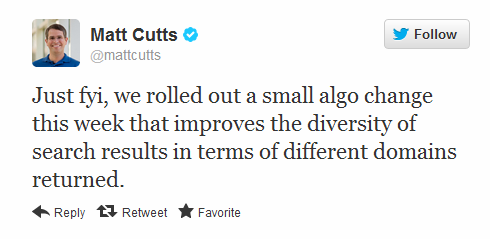Content marketing strategies depend largely on developments and trends emerging on the internet. Frequently, however, marketers spend their time wondering how exactly they can leverage SEO or website content to make their businesses more successful on the web in terms of driving traffic, leads and conversions. Last week, Brafton featured a series of reports highlighting ways certain verticals have used content marketing illustrating that now is a good time for some laggard businesses to get moving.
On Tuesday, Brafton highlighted a report from BlogHer that found 92 percent of survey respondents actively browse the web for content related to food. Whether they’re looking for new recipes or information about foods they may consider making a part of their diet, Americans want to know what they’re eating and how to prepare it.
For marketers in the food service industry or companies endorsing specialized diets, search optimized site content serves as a strong avenue to reach new prospects. Brafton reported that these shoppers want information they can trust and consistent updates about ways to improve their eating habits. This isn’t different from any other industry, either. Consumers and B2B buyers alike have access to more potential vendors than ever, and an engaging, high-quality website can help a business attract new customers and clients.
The same is true for travel and hospitality companies. The Travel Leaders Group released a report that found interest in holiday-related travel is on the rise this year. Adjusting content strategies to focus on the value offered by an airline or travel company versus another can help brands stand out among convertible audiences. Brafton reported that the travel industry has been especially aggressive on the web. Developing articles that discuss some of the biggest frustrations with travel and how booking trips early can avoid these problems can convince a website visitor to work with a specific brand.
On Thursday, Brafton highlighted a report from Econsultancy that found 87 percent of marketers have adjusted and improved their SEO strategies as a result of Google’s algorithm adjustments.
Aside from new demonstrating demand for content creation, last week also provided strong reminders of the best ways to ensure articles, blog posts and other kinds of content reach the right audiences. On Thursday, Brafton highlighted a report from Econsultancy that found 87 percent of marketers have adjusted and improved their SEO strategies as a result of Google’s algorithm adjustments. Frequently assessing the search-friendliness of content and the site it’s hosted on can attract prospects and provide existing customers with a reason to return. Brafton reported that Google Penguin and Panda have changed the way marketers think of about their websites as communication hubs and sales tools. Any content developed without readers in mind will fail, and marketers have adjusted their content strategies accordingly.
As a result of these changes, the amount of time marketers dedicate to custom content and its quality is on the rise. A report from Optify suggests that 30 percent of companies spend more time on the creation and management of their site content than any other part of web marketing strategies. Brafton highlighted the report on Thursday, also detailing the growth of social marketing as a critical tool in distributing content and interacting with prospects.
For many, growing amounts of time dedicated to content has led them to look outside their companies. On Monday, Brafton released an interview with Peter Moeller, marketing director for B2B law firm, Scarinci Hollenbeck, who detailed the success his organization has found by outsourcing content marketing. According to Moeller, creating content was a necessity, and Scarinci Hollenbeck simply did not have the resources to develop a strategy and actually produce articles. Using a third-party helped his company make content work for its goals, and he advised others to see expert help, too.
“Regardless of the industry, marketers simply have to outsource certain parts of their strategies. Otherwise, you’ll have to hire a full editorial staff, and that may not be the most cost-effective option to perfect each element of your content campaign.” – Peter Moeller, marketing director for Scarinci Hollenbeck
“Regardless of the industry, marketers simply have to outsource certain parts of their strategies,” he said in an interview with Brafton. “Otherwise, you’ll have to hire a full editorial staff, and that may not be the most cost-effective option to perfect each element of your content campaign.”
Part of the motivation for Moeller and other organizations to outsource is strategic guidance to support development of the actual content. The web changes frequently and the best practices for creating a lucrative web presence do as well. Last week was a good example, with data from different organizations presenting stats and potential trends that marketers must consider when strategizing.
For example, comScore released its search market share report for August 2012 on Thursday, which detailed the strongest month ever for Bing. Microsoft’s search engine fielded 15.9 percent of search queries in the month. While Google’s dominance remained untested (with the company claiming nearly two-thirds of the market), steady improvements for Bing could make search more competitive moving forward.
Brafton also detailed the struggles of Yahoo, which continued in August. The former search leader accounted 12.8 percent of queries.
A survey from AYTM Market Research found that more than 87 percent of consumers are open to trying new search engines, and Bing may very well prove the benefactor moving forward. While Brafton reported that there is little different in terms of a strong Google SEO strategy and one for Bing, keeping an eye on developments from Bing are critical should the site grow even further.
There could even be another major player in search on the horizon, at least according to Facebook CEO Mark Zuckerberg. Speaking at TechCrunch Disrupt, Zuckerberg said that the company’s current search team may expand its focus moving forward to improve search on the site. Currently, Facebook search is best suited to create custom results based on user data within the network, but it allows users to search the web using Bing integration. Brafton reported that Zuckerberg offered no timetable, but he claimed that the network processes more than one billion searches per day, suggesting it already has a strong enough user base to work from.
Google will not give up search market share to Facebook easily, though. The company is constantly tweaking its personal results – and general web results – to offer the best possible user experience.
In fact, Brafton reported last Friday that Google rolled out a new algorithm to promote domain diversity on SERPs. This could be good news for marketers fighting to get onto page one for important keywords, though it may shrink the SEO dominance of some sites that owned almost all the real estate for certain results pages. Matt Cutts announced the rollout late Friday afternoon through his Twitter account.
With all last week’s news, it makes sense that more companies in more industries would look to move into content marketing – and we haven’t even had a Penguin update yet this month.



